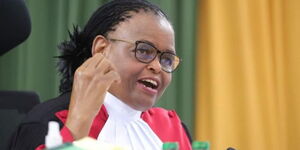President William Ruto, in his first few hours in the office, offered solutions to problems that rocked the country during his predecessor, Uhuru Kenyatta's tenure.
However, he was not short of painting Uhuru as a lame duck president who failed to adhere to the Constitution, oversaw an administration that was accused of wastage of resources and implemented projects which needed to either be abolished or reviewed.
The projects included the unsustainable fuel subsidy he stated cost taxpayers Ksh144 billion, to the Competency-Based Curriculum and freight operations at the Naivasha Dry Port, which would be reverted to Mombasa Port.
Uhuru on May 1, 2022, lamented that he was being targetted by his rivals yet the whole world was grappling with similar issues.
“Badala ya viongozi kuketi waseme watasuluhisha vipi, wengine wanaenda huko kuincite wananchi ati waulize Uhuru. Yaani, mimi, mimi niko Ukraine jameni? Mimi nilitoa pandemic huko nikaleta? Badala ya kuja kunisaidia na mawaidha tuokoe watu wetu, wewe uko kwa soko na matusi?
(Instead of some leaders strategising on how to offer solutions, they go to incite citizens to ask Uhuru. I'm I in Ukraine? Did I bring the pandemic into the country? Instead of coming to help me with advice to help our people, you are in the market with insults)," Uhuru complained.
In his inaugural speech at the Kasarani Stadium on Tuesday, September 13, Ruto further resolved the tattered relationship between the Executive and the Judiciary by appointing six judges Uhuru had declined to promote.
Despite the former President's reiterating that his government was concerned about the welfare of its people, Kenyans felt the pinch of the increase in the cost of living - with the cost of most basic commodities hitting the roof.
During the campaigns, Ruto sided with the public, seeking a remedy for the tribulations. Nonetheless, he was met with hostility, with Uhuru and allies asking him why he did not do so yet he too was in government, serving as the deputy president. He responded by claiming that his hands were tied.
Solving the High Cost of Food
In his maiden speech, Ruto delivered a promise he made during his campaigns by lowering the cost of fertilizers in the country. This falls in line with his grand plan of reducing the cost of food.
He explained that by lowering the cost of production of crops such as millet, maize and sorghum, the cost of the packaged fortified flour would drop.
"For the short rain season, we have already made arrangements to make 1.4 million bags of fertilizer available at Ksh3,500 for a 50kg bag down from the current Ksh6,500. This will be available from next week," he stated.
The president explained his resolution not to introduce subsidies on the final product, stating that they not only disrupted the market but also opened an avenue for public funds to be misappropriated.
"There was an attempt to subsidize Unga in the run-up to the election, a program that gobbled up Ksh7 billion in one month, with no impact. In addition, consumption subsidy interventions are prone to abuse, they distort markets and create uncertainty, including artificial shortages of the very products being subsidized," he noted, watering down Uhuru's Unga subsidy program.
Tackling Graft and Expediting Delivery of Justice
The President has mended the broken relationship between the Judiciary and the Executive. He lauded the Judiciary for upholding the country's reputation as a state that is guided by the Constitution.
He also expressed confidence in Chief Justice Martha Koome-led arm of government in tackling graft which was a key issue in Uhuru's administration.
That withstanding, Ruto promised to fund the Judiciary, not only to tackle corruption but also to expedite the process of administration of justice and vowed to lead by example in respecting the rule of law.
"My administration will scale up the budgetary allocation to the Judiciary by an additional Ksh3 billion annually for the next five years.
"These interventions will empower the Judiciary to adjudicate and expeditiously conclude corruption cases, commercial disputes and all other matters, thereby enhancing access to justice and efficiency in the Judiciary," he declared.
In addition, he appointed six judges to the Court of Appeal as recommended by the Judicial Service Commission (JSC). These were Korir Weldon, Muchelule Aggrey, Odunga George, Joel Ngugi who were promoted to the Court of Appeal and Makori Evans Kiago and Cheruiyot Omange Judith Elizabeth appointed to be judges of the Environment and Land Court.
Instituting National Police Service Reforms
The fifth President noted that indeed corruption of the police service undermines the administration of justice but reckoned that NPS's independence was undermined by dependence on the Office of the President.
Consequently, he ordered an end to the ties of the disciplined forces' finances to the Office of the President.
"I have instructed the transfer of the NPS budget from the Office of the President and designating the Inspector-General as the accounting officer, be placed on my desk for signature,"
"Financial independence to the police will give impetus to the fight against corruption, and end the political weaponization of the criminal justice system; an undertaking I made to the people of Kenya," the head of state explained.
Port of Mombasa
President Ruto reversed a directive issued during Uhuru's government that transferred the functions of the Mombasa port to the inland depot at Naivasha.
The head of government noted that the move increased unemployment in the county, while the nation grapples with a high unemployment rate.
"I will be issuing instructions for clearing of all goods and other attendant operational issues to revert to the port of Mombasa," he stated.
Ruto noted that his government had initiated a conversation with the Technical and Vocational Education and Training (TVET) institutions to empower the youth with skills that will enable them to earn jobs with state programmes.
"To deal with the huge challenge of youth unemployment we will roll out our social and affordable low-cost housing program, targeting an average of 250,000 units a year. This will create opportunities in the entire job market.
"We will engage TVET institutions to provide necessary skills to enable the Jua Kali industry to supply standardized products for our housing program," the president expounded.
Fuel Subsidy and CBC
Ruto also stated that he would end the fuel subsidy that cost taxpayers Ksh taxpayers had spent Ksh144 billion, including Ksh60 billion, in the last four months alone and form a taskforce to review the Comptency-Based Curriculum.
Political analyst, Mark Bichache, however, told Kenyans.co.ke that some of the actions by Ruto could be a well-calculated move to win the nation and give him an upper hand in his pre-paration for his re-election.
Heads of States Recognise Uhuru
Nonetheless, other heads of state lauded Uhuru for steering Kenya through the pandemic, playing a key role in fostering peace in Africa and handing over power peacefully.
"Thank you Mheshimiwa Uhuru Kenyatta for leading Kenya for the last 10 years," Uganda's president Uhuru Kenyatta.
"Congratulations to Uhuru for finishing his term well and if there is a gift Kenya has given the East African region during the electioneering period, it is the gift of peace," Tanzania's president, Samia Suluhu added.
Ruto also offered Uhuru a role to serve as Kenya's special envoy.












